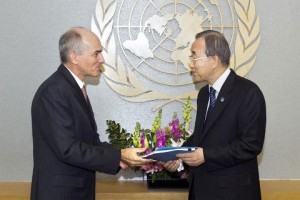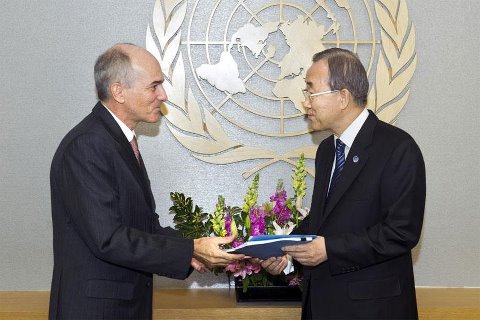 |
| Report appears to be another attempt at castigating Sri Lanka |
The Ministry of External Affairs today releasing a statement questioned the integrity of the report, the leak to the media, the sections of the report that have been blacked out and the accusations against the Sri Lankan government.
“The Ministry, through its Permanent Mission in New York protested against the leak of the Report on the very day after this questionable action, to the Office of the Secretary General. The “Petrie Report” is an internal document to assess the working of the United Nations system in Sri Lanka during a given period, following a recommendation in the Report of the advisory Panel of Experts appointed by the Secretary General, known as the “Darusman Report”,” it said.
| The full statement:
The Ministry of External Affairs refers to the “Report of the Secretary General’s Internal Review Panel on UN action in Sri Lanka” or the “Petrie Report” which was leaked to the media the day prior to its being formally handed over to the Secretary General on 14th November, and officially made public the same day. While this Report is an internal review of the UN’s action in Sri Lanka during the terrorist conflict, the Ministry’s attention has been drawn to certain issues with regard to allegations directed at the Government of Sri Lanka, which are regrettably unsubstantiated, erroneous and replete with conjecture and bias. The Ministry, therefore, wishes to state the following:- The Ministry, through its Permanent Mission in New York protested against the leak of the Report on the very day after this questionable action, to the Office of the Secretary General. The “Petrie Report” is an internal document to assess the working of the United Nations system in Sri Lanka during a given period, following a recommendation in the Report of the advisory Panel of Experts appointed by the Secretary General, known as the “Darusman Report”. While noting that both these Reports are internal advisories to the UN, it is disconcerting that the Darusman Report came into the public domain initially through a leak, and in this instance of the Petrie Report too, the unacceptable procedure of leaking has been resorted to, establishing a disturbing pattern which brings into question the bona fides of the authorship of the document and its underlying motivation. It may be recalled that following the leak of the Petrie Report, while the UN Spokesman took the position that he could not comment on a leaked Report, the author stated to the media that the penultimate draft “very much reflects the findings of the Panel”. Following formal discussions on this issue by the Permanent Representative in New York, with the UN Secretariat, the latter characterized the Report as a document prepared by an independent body over which the Secretariat and has no control. However the expectation of a sovereign Government, quite legitimately, is that the accepted procedure of first consulting with the country concerned be rigidly adopted when commissioning experts. It is pertinent to recall, in the context of a recurring pattern, that the Darusman Report was formally made available by the UN to the public on the basis that it first leaked through the media, and in fact the Petrie Report also was formally released to the media the day after its leak. The Government of Sri Lanka does not intend to comment on the entirety of its contents. However, some of the issues raised in the Report are of grave concern to Sri Lanka, and should not be construed as the accepted position. This Report seems to seek to endorse the baseless and discredited allegations in the Darusman Report, of an exaggerated civilian casualty figure during the last stages of the terrorist conflict, which has not been agreed upon even among the senior UN officials at the time, because of the speculative nature of the information which could not be verified. The statistics in the Petrie Report are based on “unnamed sources” quoted in the Darusman Report and unsubstantiated allegations made by NGOs and certain lower level UN officials. However, a censored section of this Report refers to a meeting of the Policy Planning Committee to discuss Sri Lanka where several participants including the then Under Secretary General for Humanitarian Affairs and the Resident Coordinator did not stand by the casualty numbers, saying that the data were ‘not verified’ and questioned the proposal by the Office of the High Commissioner for Human Rights to release a public statement containing references to the numbers and possible crimes. No mention has been made of the intransigence of the LTTE which held the people as a human shield, and even shot in cold blood those who tried to escape to gain their freedom. While the Report admits that the LTTE positioned its artillery among civilians, the allegation of Government shelling into civilian concentrations does not take into account the principles of self defence or reasonableness of retaliation, proportionality, or a technical analysis of the trajectories of the shells allegedly fired, to determine their source. Repeated characterization of the welfare villages without any basis as “military run internment camps” demonstrate the ignorance on the part of the author of the Report, as well as resolve to ignore the efforts taken by the Government to provide basic needs and essential services to the thousands of displaced civilians who fled from the stronghold of the terrorists to the Government side. Without the assistance of the military at that juncture, the GOSL could not have handled the magnitude of the humanitarian task at hand. The military’s role in responding to any humanitarian crisis is well established the world over. It has been in this sense that the military has been engaged in Sri Lanka to overcome the challenges of the terrorist conflict. Furthermore, while it refers to the military campaign to defeat the LTTE, the Report makes scant reference to the long series of negotiations engaged in by successive Governments to arrive at a peaceful settlement, while all those efforts and brief periods of ceasefire were used by the LTTE to regroup and rearm, to be subsequently unilaterally violated. The Report appears to be another attempt at castigating Sri Lanka for militarily defeating a ruthless terrorist group which has held the very people it claimed to represent as human shields. The basis for blacking out sections of the Petrie Report is unclear and it is left to the GoSL to surmise that references which may serve positively are those which have been censored. In this context, attention is drawn to the following blacked out sections, inter-alia :- • The Policy Committee met two days later on 12th March 2012 to discuss Sri Lanka. Participants noted variously that “this crisis was being somewhat overlooked by the international community”, the policy “of incorporating a series of high level visits seem to have produced some positive results”, and that the possible involvement of the Special Advisor on the Prevention of Genocide would not indicate a suspicion of genocide but may add to the overcrowding of UN actors involved……..”. • On 30 July the Policy Committee met again at UNHQ to address “follow-up on accountability” in Sri Lanka discussing whether or not the Secretary General should establish an international Commission of Experts, many participants were reticent to do so without the support of the Government and at a time when Member States were also not supportive…..”. The Secretary General said that the Government should be given the political space to develop a domestic mechanism……..”. This practice of redacting clearly brings into question, yet again, the sincerity and objectives of this entire exercise. |
